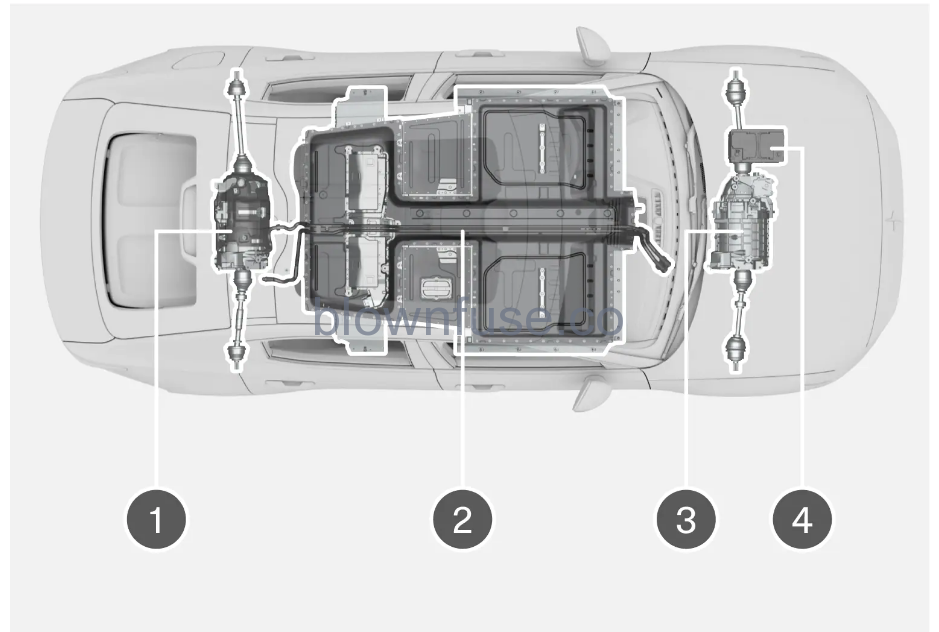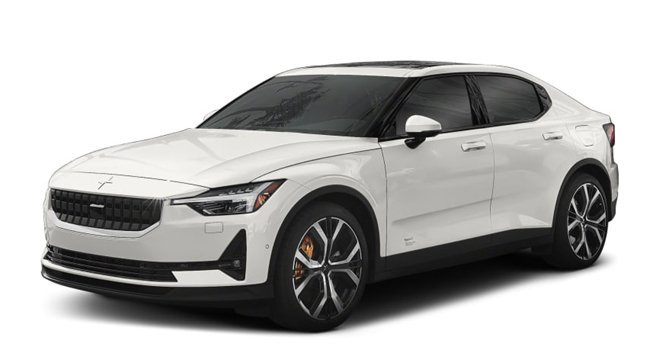2022 Polestar 2 Electric motor and charging General topics
Battery recycling
Consult with Polestar Customer Support if you have any questions or concerns about the disposal of this type of waste. Only authorized workshop personnel may handle high-voltage batteries.
Drive systems

- Electric motor For vehicles with two electric motors. – The vehicle contains two electric motors that power the vehicle and recover braking energy to convert it into electrical energy.
- High-voltage battery – The vehicle contains a high-voltage battery. The function of the high-voltage battery is to store energy. This energy is provided by plugging the charging cable into an electrical outlet and through regenerative braking.
- Electric motor – The vehicle’s electric motor powers the vehicle and recovers braking energy to convert it into electrical energy.
- 12 V battery – The vehicle contains a 12 V battery that starts the vehicle’s electrical system and powers the electrical equipment in the vehicle.
General information about charging
Different types of charging the hybrid battery’s charging time depends on the amperage used. The 12 V battery is charged even when the vehicle is being charged.
Charging via wall outlet (AC charging)The vehicle can be charged via a regular wall outlet. Suitable as extra charging for electric vehicles but not recommended for regular charging.
Charging via charging station (AC charging)The charging station may be equipped with either a permanent charging cable or with a socket where a mode 3 charging cable can be connected. This type of charging is recommended for regular charging.
Rapid charging via charging station (DC charging)The vehicle supports rapid charging with direct current (DC) at charging stations supporting the CCS (Combined Charging System) standard. Charging with direct current usually enables higher charging output and thereby shorter charging times. The highest charging output is normally achieved when the charge level of the battery is 0-30%, after which the charging output gradually decreases.
Temperature effects hybrid battery with an associated electrical drive system works better when they are at the correct operating temperature.
The high voltage battery may have reduced performance if the temperature in the battery is too low or too high.
Leaving the vehicle for prolonged periods at temperatures under –10 °C (14 °F) or over 40 °C (104 °F) may reduce the performance of the high-voltage battery. Plug in the vehicle to charge to help prevent the battery from becoming too hot or too cold.
Important
The capacity of the high-voltage battery decreases somewhat with age and use.
California Proposition 65
Operating, servicing, and maintaining a passenger vehicle can expose you to chemicals including engine exhaust, carbon monoxide, phthalates, and lead, which are known to the State of California to cause cancer and birth defects or other reproductive harm. To minimize exposure, avoid breathing exhaust, do not idle the engine except as necessary, service your vehicle in a well-ventilated area and wear gloves or wash your hands frequently when servicing your vehicle. For more information go to www.P65Warnings.ca.gov/passenger-vehicle.
If the high-voltage battery needs to be replaced, contact Polestar Customer Support.
Exterior sound when the vehicle is being powered by electricity, an artificial exterior sound will play in the background. This sound is intended to help warn children, pedestrians, cyclists, animals, etc. outside the vehicle of the vehicle’s approach.
High-voltage electrical current

The electrical system in your vehicle uses a high-voltage electrical current. Any damage to this system or to the high-voltage battery may result in the danger of overheating, fire, or serious injury. If the vehicle is involved in a collision or exposed to flooding, fire, etc., contact Polestar Customer Support. Prior to this inspection, the vehicle should be parked outdoors at a safe distance from any building or potentially flammable materials.
A number of electrical components in the vehicle use high-voltage current and can be extremely dangerous if handled incorrectly. These components and any orange wiring in the vehicle may only be handled by trained and qualified Polestar service technicians.
Do not touch anything that is not clearly described in this Owner’s Manual.
Range assistant
To help guide drivers in their driving, real-time information is provided on the impact of each energy consumption factor on the range. If speed, driving style, or climate settings are adjusted, the estimated range is updated.
ECO climate can also be activated or deactivated in the range assistant.
- Tap.
- Select Range assistant.
- Activate or deactivate Eco climate.
Recommendations for long-term storage
Preparing for long-term storage
- The recommended charge level for long-term storage is between 40% and 50%. Set the recommended charge level in the center display.
- If the charge level is higher than this recommended level, drive the vehicle until it has reached the recommended level.
- If the charge level is lower than recommended, charge the vehicle to the recommended level.
- The recommended tire inflation pressure during long-term storage is 330 kPA (48 PSI). Check the inflation pressure of the tires and adjust it to the correct pressure, which can be found on the vehicle’s tire information decal or certification label.
During long-term storage
- Make sure that the charging cable is plugged into a 120/240 V outlet (alternating current).
- Check the charge level regularly and charge to an appropriate level if it falls below 20%.
- If you plan to store the vehicle for longer than 3 months, it is recommended that the vehicle has a constant AC (alternating current) charge connected, with a maximum charge level set to 40% or 50%. Check regularly to make sure the AC charging is working.
Store the vehicle in as cool a location as possible to minimize battery aging during long-term storage. In the summer, park the vehicle indoors or in a shady location, whichever is cooler.
After long-term storage
- Check the brakes by driving the vehicle slowly for a short distance. Depress the brake pedal five times (hold down for five seconds each time).


